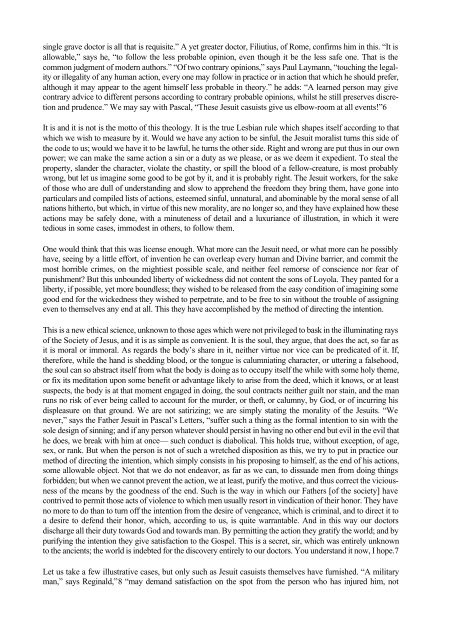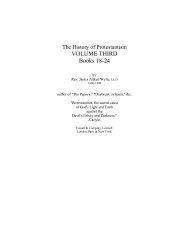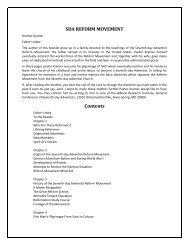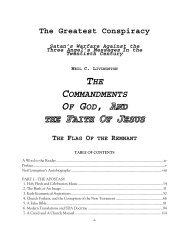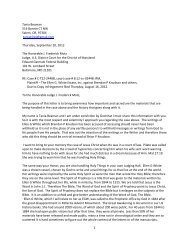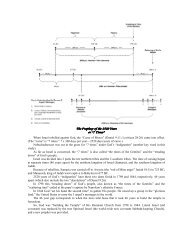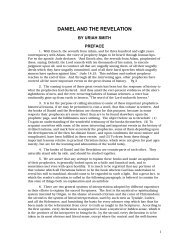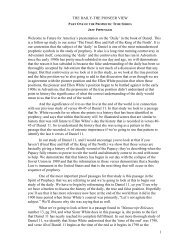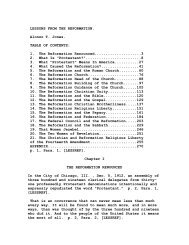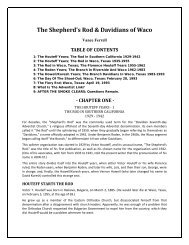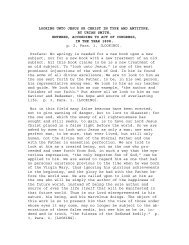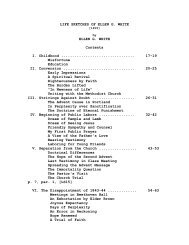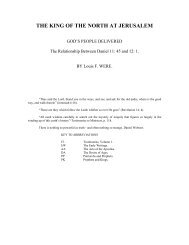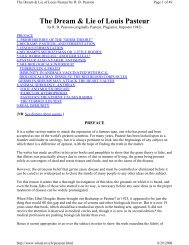History of Jesuits
History of Jesuits
History of Jesuits
You also want an ePaper? Increase the reach of your titles
YUMPU automatically turns print PDFs into web optimized ePapers that Google loves.
single grave doctor is all that is requisite.” A yet greater doctor, Filiutius, <strong>of</strong> Rome, confirms him in this. “It is<br />
allowable,” says he, “to follow the less probable opinion, even though it be the less safe one. That is the<br />
common judgment <strong>of</strong> modern authors.” “Of two contrary opinions,” says Paul Laymann, “touching the legality<br />
or illegality <strong>of</strong> any human action, every one may follow in practice or in action that which he should prefer,<br />
although it may appear to the agent himself less probable in theory.” he adds: “A learned person may give<br />
contrary advice to different persons according to contrary probable opinions, whilst he still preserves discretion<br />
and prudence.” We may say with Pascal, “These Jesuit casuists give us elbow-room at all events!”6<br />
It is and it is not is the motto <strong>of</strong> this theology. It is the true Lesbian rule which shapes itself according to that<br />
which we wish to measure by it. Would we have any action to be sinful, the Jesuit moralist turns this side <strong>of</strong><br />
the code to us; would we have it to be lawful, he turns the other side. Right and wrong are put thus in our own<br />
power; we can make the same action a sin or a duty as we please, or as we deem it expedient. To steal the<br />
property, slander the character, violate the chastity, or spill the blood <strong>of</strong> a fellow-creature, is most probably<br />
wrong, but let us imagine some good to be got by it, and it is probably right. The Jesuit workers, for the sake<br />
<strong>of</strong> those who are dull <strong>of</strong> understanding and slow to apprehend the freedom they bring them, have gone into<br />
particulars and compiled lists <strong>of</strong> actions, esteemed sinful, unnatural, and abominable by the moral sense <strong>of</strong> all<br />
nations hitherto, but which, in virtue <strong>of</strong> this new morality, are no longer so, and they have explained how these<br />
actions may be safely done, with a minuteness <strong>of</strong> detail and a luxuriance <strong>of</strong> illustration, in which it were<br />
tedious in some cases, immodest in others, to follow them.<br />
One would think that this was license enough. What more can the Jesuit need, or what more can he possibly<br />
have, seeing by a little effort, <strong>of</strong> invention he can overleap every human and Divine barrier, and commit the<br />
most horrible crimes, on the mightiest possible scale, and neither feel remorse <strong>of</strong> conscience nor fear <strong>of</strong><br />
punishment? But this unbounded liberty <strong>of</strong> wickedness did not content the sons <strong>of</strong> Loyola. They panted for a<br />
liberty, if possible, yet more boundless; they wished to be released from the easy condition <strong>of</strong> imagining some<br />
good end for the wickedness they wished to perpetrate, and to be free to sin without the trouble <strong>of</strong> assigning<br />
even to themselves any end at all. This they have accomplished by the method <strong>of</strong> directing the intention.<br />
This is a new ethical science, unknown to those ages which were not privileged to bask in the illuminating rays<br />
<strong>of</strong> the Society <strong>of</strong> Jesus, and it is as simple as convenient. It is the soul, they argue, that does the act, so far as<br />
it is moral or immoral. As regards the body’s share in it, neither virtue nor vice can be predicated <strong>of</strong> it. If,<br />
therefore, while the hand is shedding blood, or the tongue is calumniating character, or uttering a falsehood,<br />
the soul can so abstract itself from what the body is doing as to occupy itself the while with some holy theme,<br />
or fix its meditation upon some benefit or advantage likely to arise from the deed, which it knows, or at least<br />
suspects, the body is at that moment engaged in doing, the soul contracts neither guilt nor stain, and the man<br />
runs no risk <strong>of</strong> ever being called to account for the murder, or theft, or calumny, by God, or <strong>of</strong> incurring his<br />
displeasure on that ground. We are not satirizing; we are simply stating the morality <strong>of</strong> the <strong>Jesuits</strong>. “We<br />
never,” says the Father Jesuit in Pascal’s Letters, “suffer such a thing as the formal intention to sin with the<br />
sole design <strong>of</strong> sinning; and if any person whatever should persist in having no other end but evil in the evil that<br />
he does, we break with him at once— such conduct is diabolical. This holds true, without exception, <strong>of</strong> age,<br />
sex, or rank. But when the person is not <strong>of</strong> such a wretched disposition as this, we try to put in practice our<br />
method <strong>of</strong> directing the intention, which simply consists in his proposing to himself, as the end <strong>of</strong> his actions,<br />
some allowable object. Not that we do not endeavor, as far as we can, to dissuade men from doing things<br />
forbidden; but when we cannot prevent the action, we at least, purify the motive, and thus correct the viciousness<br />
<strong>of</strong> the means by the goodness <strong>of</strong> the end. Such is the way in which our Fathers [<strong>of</strong> the society] have<br />
contrived to permit those acts <strong>of</strong> violence to which men usually resort in vindication <strong>of</strong> their honor. They have<br />
no more to do than to turn <strong>of</strong>f the intention from the desire <strong>of</strong> vengeance, which is criminal, and to direct it to<br />
a desire to defend their honor, which, according to us, is quite warrantable. And in this way our doctors<br />
discharge all their duty towards God and towards man. By permitting the action they gratify the world; and by<br />
purifying the intention they give satisfaction to the Gospel. This is a secret, sir, which was entirely unknown<br />
to the ancients; the world is indebted for the discovery entirely to our doctors. You understand it now, I hope.7<br />
Let us take a few illustrative cases, but only such as Jesuit casuists themselves have furnished. “A military<br />
man,” says Reginald,”8 “may demand satisfaction on the spot from the person who has injured him, not


